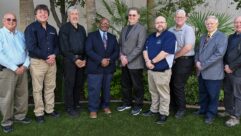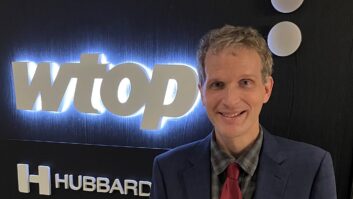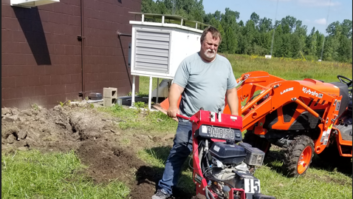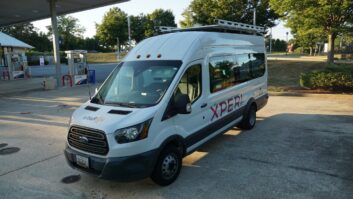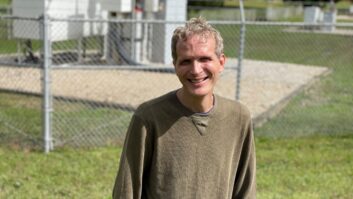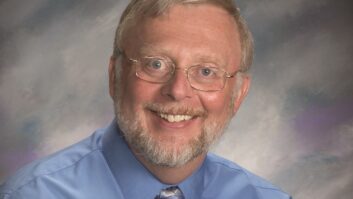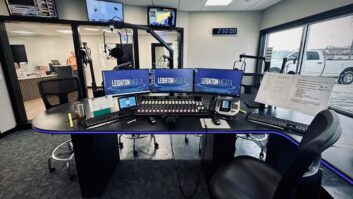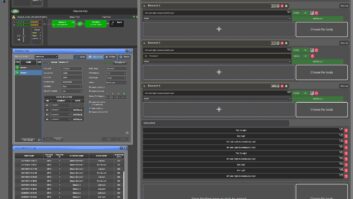One in a series of occasional articles about the next generation of engineers and others who don’t fit traditional stereotypes.
When you’re 26 years old and share engineering responsibilities for 40 radio stations over nine states with only two other people, you’ve got plenty to do.
Meet Dave Hodges, an engineer for Positive Alternative Radio and Positive Radio Group, both based in Blacksburg, Va.
“The first company oversees our non-commercial religious stations,” said Hodges. “And the second handles our commercial side. The commercial formats are varied, anything from sports to country to news/talk.”
While he was getting his B.S. in electrical and computer engineering at Rose-Hulman Institute of Technology, Hodges did a little on-air work at WMHD(FM) on campus.
“The station was in the basement of my freshman dorm and I could watch DJs spinning records and CDs and radio grew on me,” he said. “I decided it was what I really wanted to do.”
What’s in your tool kit?
Much of radio engineering was about RF and knowing how to design studios around (and then service) analog equipment to keep it running. Today’s radio station is much more computer-based, so it makes sense that a young engineer is comfortable in the IT world.
“There isn’t a lot of RF work left in our industry,” said Hodges. “No one teaches tube theory anymore, unless you’re in the military. So I grew up with computers and enjoy that area the most.”
(click thumbnail)But when an RF problem comes up, he relies on Winston Hawkins, his company’s chief engineer.
“He has been really helpful to me,” said Hodges. “And he’s also good with automation systems. I was never really trained to operate those and in college we had a really crude system that a friend of mine programmed from scratch.
“Now that I’m into more complicated systems with switchers, routers and schedules, Winston can answer my questions. At our stations we’ve been standardizing our studios with (OMT Technology’s) iMediaTouch.”
Some of the company’s stations are still using a 15-year-old system for which phone support is no longer available.
“Without support, it’s difficult to keep it running. But for some of our satellite-programmed stations that don’t have to do a lot, it’s OK.”
Taking care of business
Hodges is involved with planning and building news studios, and works with fellow engineer Joel Wright to install new equipment.
“Scheduling is the most difficult challenge,” he said. “If there is a fire and we need to run, we do so. After that, we have to decide who can wait, which calls for judgment and sometimes causes hurt feelings because we have to leave one station to work at another.
“Occasionally there are two emergencies at once and we have to decide which station will be hurt most by missed billing due to being off the air.”
Hodges is looking forward to three new non-commercial FM stations that will be built within the next year.
“We’re gearing up for that,” he said. “These are in West Virginia and we’ll be starting from scratch including the tower. I’m excited. They’ll be HD, probably the first fully HD stations we’ll be building. Ours is a mid-sized group and a lot of our stations haven’t yet gotten into HD, which is pretty much just a major-market thing now.”
Asked about his worst days, he says he tries to block them out.
“Two years ago we had a station that got hit by lightning and I was four hours away and had to turn around and drive back there. The power company didn’t get us back on until dark, and lightning had destroyed our satellite receivers, automation and consoles. We had four stations in that cluster and only one was running when the power came back on. We had to replace everything.”
On the brighter side
There may be frustrations with the job, but there are also gratifying moments.
“The most rewarding project I’ve done was given to me early in my job here,” he said.
“We were changing two stations over to ESPN affiliates and I was put in charge of moving and installing the satellite dishes, wiring satellite receivers and adjusting the automation system for the new programming. Both stations were in different states and went live on the same day. I was pleased when the company placed this much confidence and trust in me.”
The commercial stations in the group are owned and run by several generations of the Baker family. Dr. Vernon Baker is CEO, Vernon’s wife Virginia Baker is treasurer and son Eddie is the president of the company. These three are also on the board of the non-commercial group.
According to Hodges, working for a small company has its advantages.
“I feel that the staff and management genuinely care about the well-being of everyone,” he said. “The individuals in charge care just as much about my future as they do about their own and I don’t come into work worrying the stockholders have sold our company to the highest bidder overnight.”
Hodges is single, with a cat his sole companion at home at present. He said this works out well because he travels three to four days each week.




